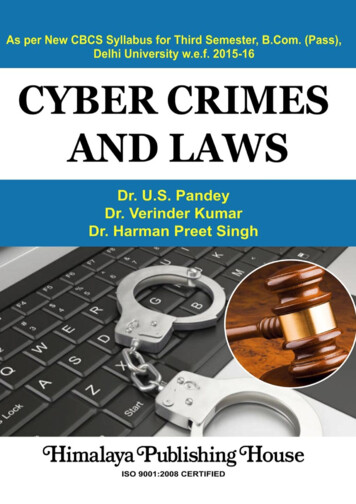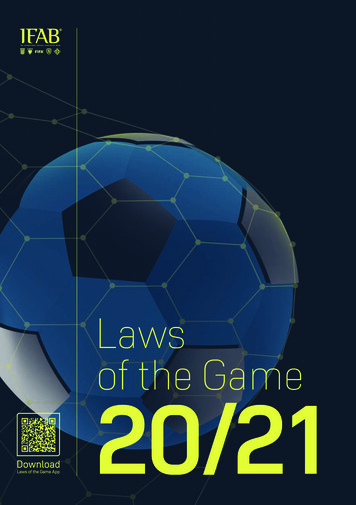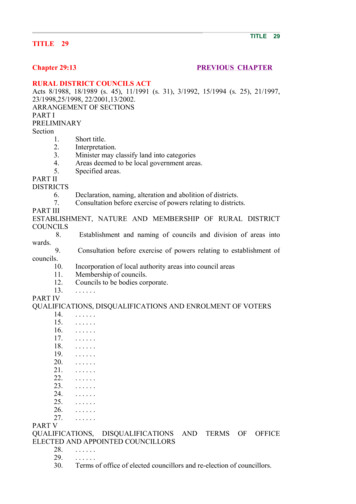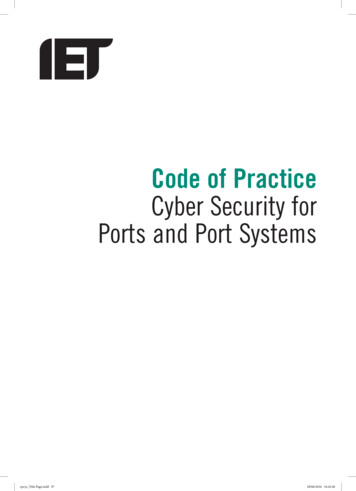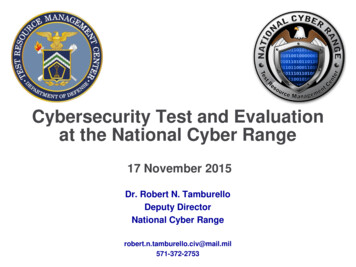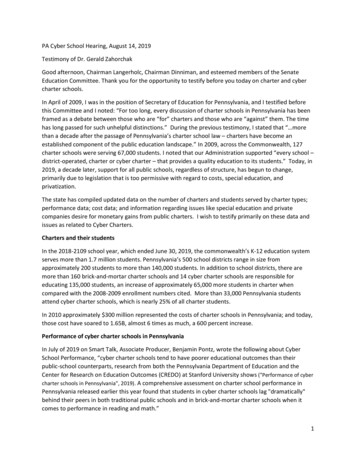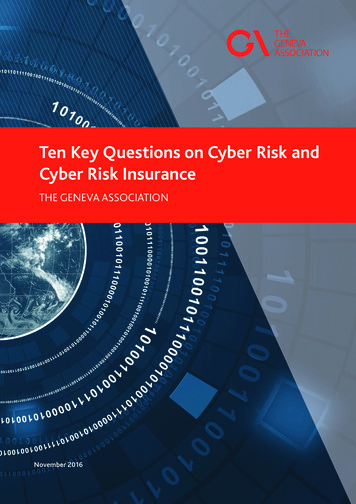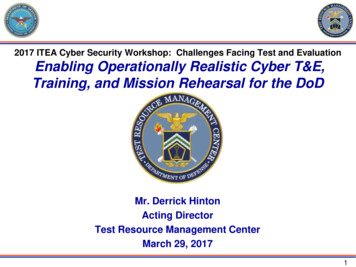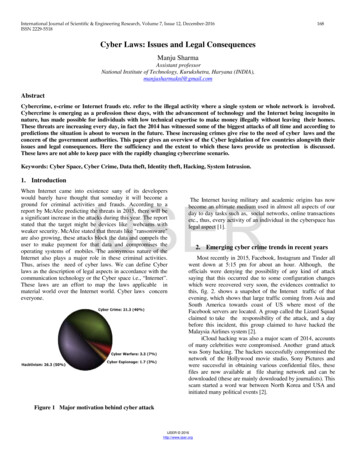
Transcription
International Journal of Scientific & Engineering Research, Volume 7, Issue 12, December-2016ISSN 2229-5518168Cyber Laws: Issues and Legal ConsequencesManju SharmaAssistant professorNational Institute of Technology, Kurukshetra, Haryana , e-crime or Internet frauds etc. refer to the illegal activity where a single system or whole network is involved.Cybercrime is emerging as a profession these days, with the advancement of technology and the Internet being incognito innature, has made possible for individuals with low technical expertise to make money illegally without leaving their homes.These threats are increasing every day, in fact the 2014 has witnessed some of the biggest attacks of all time and according topredictions the situation is about to worsen in the future. These increasing crimes give rise to the need of cyber laws and theconcern of the government authorities. This paper gives an overview of the Cyber legislation of few countries alongwith theirissues and legal consequences. Here the sufficiency and the extent to which these laws provide us protection is discussed.These laws are not able to keep pace with the rapidly changing cybercrime scenario.Keywords: Cyber Space, Cyber Crime, Data theft, Identity theft, Hacking, System Intrusion.1. IntroductionIJSERWhen Internet came into existence sany of its developerswould barely have thought that someday it will become aground for criminal activities and frauds. According to areport by McAfee predicting the threats in 2015, there will bea significant increase in the attacks during this year. The reportstated that the target might be devices like webcams withweaker security. McAfee stated that threats like "ransomware"are also growing, these attacks block the data and compels theuser to make payment for that data and compromises theoperating systems of mobiles. The anonymous nature of theInternet also plays a major role in these criminal activities.Thus, arises the need of cyber laws. We can define Cyberlaws as the description of legal aspects in accordance with thecommunication technology or the Cyber space i.e., “Internet”.These laws are an effort to map the laws applicable inmaterial world over the Internet world. Cyber laws concerneveryone.The Internet having military and academic origins has nowbecome an ultimate medium used in almost all aspects of ourday to day tasks such as, social networks, online transactionsetc., thus, every activity of an individual in the cyberspace haslegal aspect [1].2. Emerging cyber crime trends in recent yearsMost recently in 2015, Facebook, Instagram and Tinder allwent down at 5:15 pm for about an hour. Although, theofficials were denying the possibility of any kind of attacksaying that this occurred due to some configuration changeswhich were recovered very soon, the evidences contradict tothis, fig. 2. shows a snapshot of the Internet traffic of thatevening, which shows that large traffic coming from Asia andSouth America towards coast of US where most of theFacebook servers are located. A group called the Lizard Squadclaimed to take the responsibility of the attack, and a daybefore this incident, this group claimed to have hacked theMalaysia Airlines system [2].iCloud hacking was also a major scam of 2014, accountsof many celebrities were compromised. Another grand attackwas Sony hacking. The hackers successfully compromised thenetwork of the Hollywood movie studio, Sony Pictures andwere successful in obtaining various confidential files, thesefiles are now available at file sharing network and can bedownloaded (these are mainly downloaded by journalists). Thisscam started a word war between North Korea and USA andinitiated many political events [2].Figure 1 Major motivation behind cyber attackIJSER 2016http://www.ijser.org
International Journal of Scientific & Engineering Research, Volume 7, Issue 12, December-2016ISSN 2229-5518169IJSERFigure 2 Traffic Activity to take down facebook [3]The hacking of Gmail accounts which took place in Sept.2014compromised about 5 million user accounts, approx.100,000 of which were loaded up on a Russian site. The eBayhacking incident in which hackers compromised accounts ofemployee at eBay, and got the contact information of about233 million customers, caused eBay to request all its customersto change their passwords.These attacks drew the concern of the government ofvarious countries towards computer systems and networks. Inthe International Conference on Cyber law, Cybercrime &Cyber Security which was held in India in November 2014,featured some major challenges which affect the crossway ofCybercrime with Cyber laws and security and led to severalrecommendations for stakeholders. In 2014, it was once againwitnessed that cyber laws all over the world are still laggingbehind to deal with the emerging cyber crime trends [3].In 2014, emergence of the dark web was marked andcybercrime emerged as an economy model in the dark webcame into picture. During this year FBI was successful inclosing down Silk Road 2.0 (Silk Road 1.0 was closed in2013). It was shown that the current status of cyber laws andpolicies requires lot of amendments and strengthening or itwill not be able to convict the cyber criminals [3,4].3. Cyber laws in Indiaand categorize them as legal or illegal and punishable. The ITact of 2000 provides a legal structure all form of electronicinformation is validated and cannot surpass the legal effect.3.1 Scope and ApplicabilityThe scope and applicability of ITA-2000 was enhanced byan amendment passed in 2008. India is the 12country acrossthe globe which has cyber legislation apart from countries likeUSA, Japan, Malaysia, Singapore etc. The ITA-2000 provideslegal policies which provide a legal effect on information.From the point of view of Indian e-commerce many positiveprovision are provided by Indian cyber legislation. This actdeclared email as a legal mode of communication which can bedemonstrated and verified in the court of law. Digitalsignatures were also given legal validity. Under the legislationcorporates can now have required remedies in case of theirsystems or networks being compromised.3.2 ITA 2000The IT Act 2000 was passed to update the old laws andfacilitates measures to handle cybercrimes in better way. Abrief overview of the law is given below [5]:Incorporating Cyber laws aim to set some guidelines andpatterns to control the transactions carried out on the webIJSER 2016http://www.ijser.org
International Journal of Scientific & Engineering Research, Volume 7, Issue 12, December-2016ISSN 2229-55181.To develop a secure cyberspace that protects informationand information infrastructure and builds trust in ITSector.2.To promote the security of the cyberspace globally byenhancing cooperation and to develop effective publicprivate relations and partnerships through technicalcooperation.3.To form a workforce of about 500,000 skilled cybersecurity professionals in the next 5 years and improve thevisibility and integrity of ICT products by establishing abody for validation and testing of such products.4.To protect the information while in process, storage ortransmission so as to protect the privacy of citizens andreducing economic lossesTable 1: Cybercrimes and their legal actionsTYPESCRIMEHackingOFSpreadingmalware, EmailSpoofingIdentity TheftEmail Spoofing170LAW AND PUNISHMENTImprisonment extended up to 3 years, or fineof 5 lacs or both.Cognizable and bailablewith the permission of thecourtbeforeprosecutionand trail by any magistrateImprisonment which can be extended up to 3years, or fine up to 1 lacs orboth.Victim can file a complaint in the nearestpolice station. If crime is provedaccusedshallbepunishablewithimprisonment for a term which may extend tothree years and shall also be liable to the finewhichmayextendtoonelakhrupees.3.5 Issues not covered in ITAIJSERBesides, several advantages provided by this Act, it is still notsufficient and has several loopholes, some of them are dable up to 5 year and fine up to 10lacs. For second conviction: imprisonmentextendable up to 7 year and fine upto 10 lacs.3.3 IT Amendment Bill 2008The word 'communication devices' was added which coveredcell phones or other devices which can be used to transmit anykind of text, audio, video etc. However, ITA- 2000 defined'digital signature', but the description was not capable to coverall the aspects and thus the term 'Electronic signature' wasdefined in ITA-2008 as a legally valid mode of executingsignatures which includes digital signatures, biometrics andother forms of electronic signatures. The term "hacking" usedin Section 66 has been replaced by "data theft". The sectiondeals with issues like sending of offensive texts, fake originsof messages, stealing of electronic signature and identity [6].3.4 National Cyber Security Policy 2013The Cyber Security policy of 2013 aimed to develop a securecyberspace for the citizens, organization and Government. Theprimary objectives of this policy were [7]:1.The law does not mention anything regarding theIntellectual Property Rights, there are no policies andrights related to copyrighting, trade marking or patentingof electronic records, domain names holders.2.There is no mention of any policies regarding the issue ofpayment gateways over the Internet.3.The act provide the Deputy Superintendent of Policefull investigation powerfor the cybercrime cases,thus the corporate organizations cannot escape thetorment from the side of the DSP.4. Cyber law in USAIn the United States, cyber laws are adopted at both state andnational level. There are certainregulations regarding thedistribution of authority between these two levels [8].4.1 Scope and ApplicabilityIn United States’ cyber legislation the regulations refer tovarious types of cybercrimes. It is considered an offense toget unauthorized access to a government computer and getconfidential information, causing damage to a computer bysome malicious program or getting illegal access, to harm asystem in order to get financial benefits etc. All the fifty statesare free to have their own legislative authorities and there is nosuch rule that laws should be uniform or consistent. Some ofenactments like, Restatements and the Model Penal codewhich are developed by private associations and wereIJSER 2016http://www.ijser.org
International Journal of Scientific & Engineering Research, Volume 7, Issue 12, December-2016ISSN 2229-5518presented to the states for adopting them so that legislationwill be uniform.5. Cyber law in EuropeThe Council of Europe [9] was established in 1949 with anobjective of strengthening human rights and democracy andpromotes and upholds the rule of law in Europe. It has 43members which comprises of all the states of the Europeanunions.5.1 Scope and Applicability171discipline, our legislature have left some lacuna in framing thebill of 2006. The bill has been drafted wholly on the structureof the UK Data Protection Act whereas today’s requirement isof a comprehensive Act. Thus it can be suggested that acompiled drafting of a data protection bill based on US lawswould be more favourable to today’s requirements.7.ConclusionCybercrimes circumscribe a variety of activities which likelyto be illegal which includes spamming, harassment, childpornography, cyber stalking, phishing scams, denial-of-serviceattacks where the computer can be used as a target or tool orboth. The governments around the globe are taking variousactions to deal with cybercrimes, butthe cyber lawcritics warn the governments of the consequences of overactivism over the Internet. Some of the researchers haveclaimed that the government policies hinder in their efforts tofind the vulnerabilities in the Internet infrastructure.The technical root of cybercrimes such as computers,networks and Internet are same for all the countries whichmeans that the nature of cybercrime is same in all thecountries. This makes the international cooperation of thecountries to deal with cybercrime necessary. Cyber laws dealwith all the phases of e-commerce and transactions and everyactivity going on in the cyberspace have a legal perspective.IJSERPeople are becoming more and more dependent onthe Internet which means that criminal activities will alsokeep on increasing. The laws making bodies of the nationshould always keep in mind the rate to development of thecybercrimes and the laws should be able to minimize them tobest possible extent. Thus, it is the responsibility of thegovernment and the law makers to make sure that everyperspective and issues of cybercrime have been included in thecyber laws which will enable the consistent and lively growthof the laws.REFERENCESFigure3: The existing EU legislation incident reporting[1] Cyber Laws India.net , “Cyber laws in India”, Available at:6. Analysis, Results and DiscussionOn relating the Indian law with the law of developed nationsthe proper requirement for the Indian law can be analyzed.Data are not of same need and importance; it varies from oneanother on the basis of utility. So we require creating separatecategories of data having different importance values, as theU.S have. Moreover the provisions of IT Act basically dealwith extraction of data, destruction of data, etc. Companiescannot get full protection of data through IT Acts whichultimately forced the private companies to enter into separateprivate contracts to secure their data. These contracts have thesame applicability as the general contract. Despite the effortsbeing made for having a data protection law as a html, Last accessed:April 2016.[2] New.com, “Facebook, Tinder and Instagram all story-fnjwnhzf1227198626109 , Last accessed: April 2016.[3] Business Standard, “Emerging Global cyber Law Trends ds-in-2014115010500301 1.html, Last accessed: April 2016.[4] Mondaq, “Cyberlaws: An Indian perspective”, Available at:http://www.mondaq.com/india/x/257328/Data Protection Privacy/An Overview Of Cyber Laws vs Cyber Crimes In Indian Perspective , Last accessed: January, 2015.IJSER 2016http://www.ijser.org
International Journal of Scientific & Engineering Research, Volume 7, Issue 12, December-2016ISSN 2229-5518[5] Information Security Awareness, “Cyber Laws of India”,[6][7][8][9]Available at: infosecawareness.in/cyber-laws, Last accessed:April 2016.“The Information technology (Amendment) Bill 2008”,Government of India, December 2008.“National Cyber Security Policy-2013”, Ministry of Informationand Communication Technology, July, 2013.S. W. Brenner, “State Cybercrime Legislation in the d:January, 2015.M. Dekker, C. Karsberg, B. Daskala, “Cyber incident reportingin EU”, European Network and Information security agency,August, 2012.IJSERIJSER 2016http://www.ijser.org172
Cybercrime with Cyber laws and security and led to several recommendations for stakeholders. In 2014, it was once again witnessed that cyber laws all over the world are still lagging behind to deal with the emerging cyber crime trends [3]. In 2014, emergence of the dark web was marked and cybercrime emerged as an economy model in the dark web
